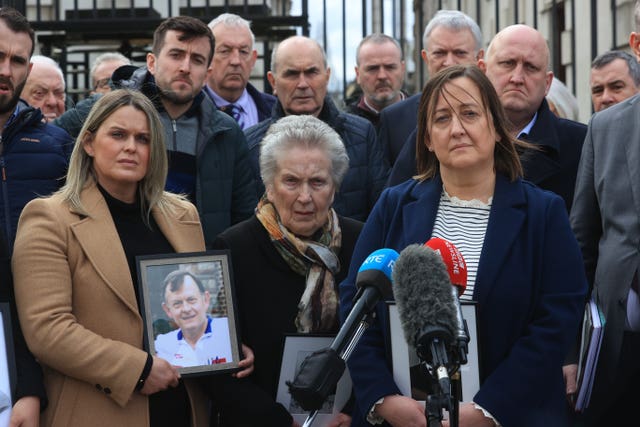Sean Brown’s family says Government legal challenge is an ‘attack on truth’
The GAA official was abducted and killed by loyalist paramilitaries as he locked the gates at Bellaghy Wolfe Tones Club in 1997.

The family of a GAA official murdered by loyalist paramilitaries has criticised the Government for taking legal action in relation to an inquest into his death.
Sean Brown, 61, was abducted and killed by loyalist paramilitaries as he locked the gates at Bellaghy Wolfe Tones Club in Co Londonderry in May 1997.
No one has ever been convicted of his murder.
An inquest was under way into his death until last month when a coroner said it could not proceed due to the withholding of sensitive files.
He said he would write to Northern Ireland Secretary Chris Heaton-Harris to call on the Government to establish a public inquiry into the loyalist murder.
On Thursday, the Government said it was making a legal challenge.
A spokesperson said: “We can confirm that an application for leave to apply for judicial review has been made relating to the inquest into the death of Sean Brown.
“It would be inappropriate to comment further at this stage given the matter is now the subject of judicial consideration.”

“We repose a high degree of cynicism as to the timing of the announcement of these judicial review proceedings, coming as they do on the on the actual date that a public inquiry decision was due,” the family statement continued.
“The Brown family are gravely concerned that this is a concerted attempt to tie them up in legal processes that could take years, and that they are being used as pawns in a wider attempt by the British Government to defend its indefensible approach to legacy.
“Today’s announcement has a retraumatising effect on a family but most specifically an 86-year-old widow, already coming to the terms with the facts that were permitted to emanate from the inquest process.
“We confirm that we retain instructions to issue our own proceedings, given the failure by the Secretary of State to make a decision within the proscribed time, in request of the direction of the High Court to convene a public inquiry.”





